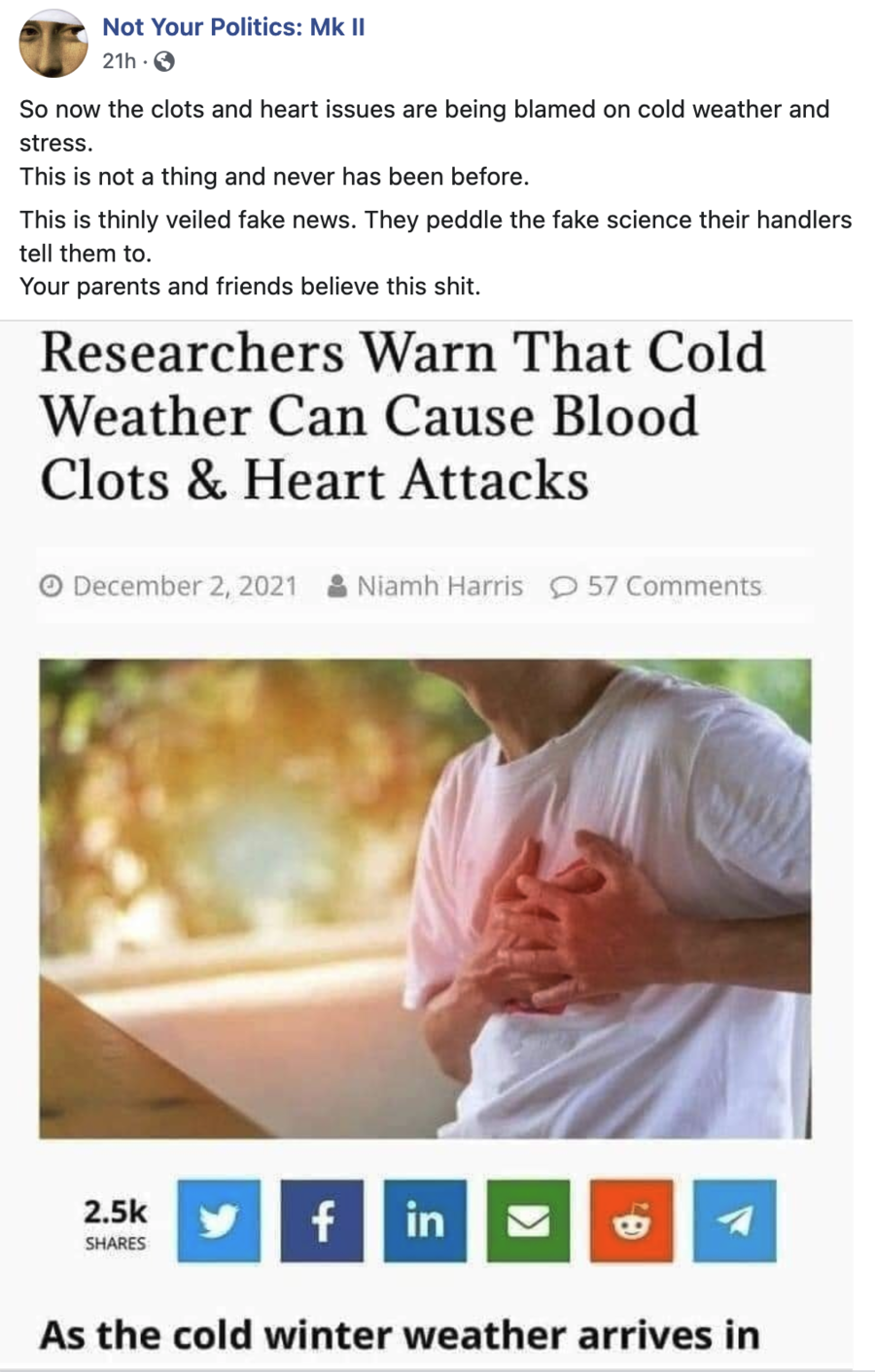
Is it false to blame blood clots and heart issues on cold weather and stress? No, that's not true: Heart issues can be caused by both cold weather and stress as reputable doctors and heart organizations have stated. The implication in a social media post that its "... not a thing..." that cold weather and stress are reported to cause heart issues and that therefore those ills are actually caused by the COVID-19 vaccines is false.
The claim appeared as a post (archived here) where it was published on Facebook on December 4, 2021. It opened:
So now the clots and heart issues are being blamed on cold weather and stress.
This is not a thing and never has been before.
This is what the post looked like on Facebook at the time of writing:
(Source: Facebook screenshot taken on Mon Dec 6 18:58:36 2021 UTC)
The full comment on the Facebook post reads:
So now the clots and heart issues are being blamed on cold weather and stress.
This is not a thing and never has been before.This is thinly veiled fake news. They peddle the fake science their handlers tell them to.
Your parents and friends believe this shit.
Heart issues caused by cold weather and stress actually are "a thing" and these have been observed longer than COVID-19 infections have been around. A 2018 study published by the Journal of the American Medical Association (JAMA) titled, "Association of Weather With Day-to-Day Incidence of Myocardial Infarction" determined that cold weather is associated with a risk of heart issues.
From the study published on JAMA:
Conclusions and Relevance In this large, nationwide study, low air temperature, low atmospheric air pressure, high wind velocity, and shorter sunshine duration were associated with risk of MI with the most evident association observed for air temperature.
The study also noted:
Minimum air temperature was negatively associated with MI, with similar results obtained with mean and maximum air temperature.
And
A number of conditions associated with an increased risk of MI are more prevalent during colder weather. Respiratory tract infections and influenza are known risk factors for MI that have a clear seasonal variation that may contribute to our findings.
The Cleveland Heart Lab cited the study in a 2018 article titled The Heart Risk That Comes with Winter, noting:
Cold weather activities like shoveling snow may also trigger heart attacks that can be deadly. That's why doctors instruct patients with known heart disease not to shovel snow at all. For others, who have risk factors, breathing cold air into the windpipe near your heart and tightening up your muscles to lift heavy snow (increasing blood pressure) can be a dangerous combination.
The cold air alone can raise blood pressure, slow down the flow of blood to the heart, and help blood clots form. Blood clots can cut off blood flow to parts of the heart muscle or brain, causing a heart attack or stroke. Patients with a history of heart disease (angina chest pain, bypass surgery, heart attack, stent, or angioplasty) are most at risk.
Stress is also a known factor in causing heart disease, contrary to the claims in the post. The American Heart Association published an article on February 4, 2020, titled, "Chronic stress can cause heart trouble." Dr. Ernesto L. Schiffrin, physician-in-chief at Sir Mortimer B. Davis-Jewish General Hospital in Montreal, said in the article, "'Irritability, anxiety, depression, rumination and insomnia or waking up in the middle of the night with anguish' can result from chronic stress." He also explained, "Chronic stress has been shown to be associated with increased cardiovascular events." Schiffrin cited a 2017 study in The Lancet "that used images of part of the brain involved with fear and stress and found links between stress and cardiovascular disease episodes. Brain activity was studied along with bone marrow activity and artery inflammation." He concluded, "These findings illustrate mechanisms through which emotional stressors can lead to cardiovascular disease in human beings."



















